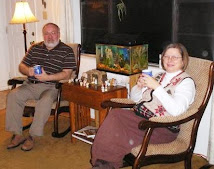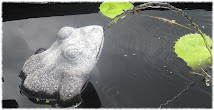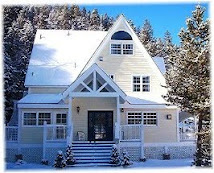Bon, I'll see your
mish-mash and raise you a tasty
salmagundi.....
Our daughter, Bonnie, wrote a blog post entitled
Mish Mashed and Smashed, which you can check out
here. She had a number of disparate topics to post but didn't think any of them merited a post of its own.
To show in what odd directions my mind shoots off, I offer this post, inspired by the "Engrish" signs in Bonnie's post. We enjoy reading some of these odd uses of English from around the world, and we often find ourselves ROTFL, too (actually I find modern Internet lingo, such as ROTFL, rather odd English, too, don't you?) But these signs led to some interesting (at least to me) "rabbit trails." Kathy was looking over my shoulder while I was reading the blog, and she said of this first sign, "We've seen that in person!" Here it is and the story behind it.

Some very close Japanese friends took us to visit this pool when we were living in Yokohama. We are quite convinced this sign is posted in
Owakudani (literally Big Bubbling [think Boiling] Valley) near Mt. Fuji at the place where the famous "Black Pearl Eggs" are made. Here's a shot of the sulfurous steam rising from the ground.

Owakudani is the area around a crater created in the last eruption of Mount Hakone 3000 years ago. Sulfurous fumes, hot springs and hot rivers can be experienced on a walk around the area. Eggs, boiled in the naturally hot waters, are said to prolong one's life by seven years and are readily available for sale. Here is one of the pools where the
kuro-tamago (black eggs) are made.

The finished product.

Here is a shot of Owakudani from the cable car. Varying degress of acrophobia in our family kept us from seeing this view of the "Great Boiling Valley" in person!
Of course, Bonnie's post piqued my curiosity in another direction. I had to see how much of the Japanese I could translate for myself (with the help of my lexicons, of course). I was hampered by not being able to see a couple of the kanji, but to the best of my ability here's what this sign reads: Abunai (Danger) Kennan (Danger--I cannot see the second kanji, so I'm not sure of this word) Netto-ni Chui (Boiling Water--Be Careful!). I could not find the first kanji in the second line anywhere. It seems as if they translated it pond, but I could not find the character in any of my dictionaries. Anyway, let's says it's pond. Then here's the interpretation: (Pond) no Naka-ni Iranai de Kudasai. Please don't go into the (pond).
There is no clearer indication than this sign of the difficulty of translating from one language to another and the fact there is no word-for-word translation from one to the other. The word order is different. The connotations, the "feel" of words differs from culture to culture and therefore from language to language.
Yet, I kind of like the straightforward "Danger. If you fall in the pond, you'll be boiled!"

Here's another funny one that Bonnie pinched from
Engrish.com. Now, we laugh, and rightfully so, because it strikes our funny bone (the "feel" of the phrase in English) but it's not the fault of the Japanese. It's a problem with English. The word toilet can mean both the room and the fixture, but we most often think of the fixture, so we think the warning is not to wash one's hair or clothes in the toilet bowl! In Japanese, the English word toilet (
toire) has been assimilated but has the connotation of the room rather than the furniture! However, this sign doesn't even use the word
toire (toilet). It uses the word
semmendai (washing stand), probably referring to the sinks!
Here's my breakdown: Kono (this) Semmendai (washing place) dewa (no real translation, but it refers to Kono Semmendai and means that that's what we're talking about), Kami (hair) o Arattari (Washing) Sentakuto (Laundry, etc.)-o-Shinai-de (Do not do) Kudasai (Please).

The final sign from Bonnie's blog is funny, but it also hurts because of the number of times I've tried to go to a dictionary and facilely complete a translation without really understanding the words. For example, if you're a non-native, non-accomplished speaker of English and you're looking for a translation of dear, you could run into trouble by misspelling (deer) or different meanings (loved and cherished versus expensive or even the obsolete noble or worthy).
Here I believe the problem arises from the word
shiyo (use). The Japanese phrase, I think, has to do with the proper use of the machine, arising from a need to buy your own tissue (not that you should buy "used" tissue). Also, there's no first person pronoun "I" in the Japanese, and of course, it sounds ridiculous in the English sentence.
Here's how I read the Japanese:
Teisshu (the English word tissue written in
Katakana)
HanBaiKi (Selling [Vending] Machine).
Go-Chui (Warning but a polite warning, indicated by the honorific
Go).
Kono Toire dewa (with regard to this Toilet),
Teisshu-o-Jobi-shite Arimasen (there is not normally tissue)
Node (Because),
Go-Shiyo-ni-naru-Ho-wa (concerning the proper use)-
o-Kai (Buy)
Motome (Request)
Kudasai (Please--a humble request).
Here's a loose translation. Tissue Machine. Caution. There is usually no toilet paper in this bathroom, so please buy some here!

We were discussing this last night and wondering whether the Korean and Chinese translations below the English are as funny-sounding in their respective languages as the English is. I never did learn to read
Hangul and don't know enough Korean to make it worthwhile. I can make out some of the Chinese characters (because they are used in Japanese) but China came up with simplications of many of the characters so that they no longer look like the Kanji I learned in Japan.
I hope this post has been of some interest to you, but even if not, I had a blast putting it together! I'll leave you with one last sign from
Engrish.com.

Caption on Engrish.com says "This explains the postage due on the toilet paper... "
Yes, this is the sign on the bathroom door. It strikes as funny because the word mailman immediately springs to mind, thus the caption. Japanese Dansei simply means "male."
For some cool pictures and more commentary on the Hakone district around Fuji-san check out this guy's blog, which I ran across while researching this post.













 Some very close Japanese friends took us to visit this pool when we were living in Yokohama. We are quite convinced this sign is posted in Owakudani (literally Big Bubbling [think Boiling] Valley) near Mt. Fuji at the place where the famous "Black Pearl Eggs" are made. Here's a shot of the sulfurous steam rising from the ground.
Some very close Japanese friends took us to visit this pool when we were living in Yokohama. We are quite convinced this sign is posted in Owakudani (literally Big Bubbling [think Boiling] Valley) near Mt. Fuji at the place where the famous "Black Pearl Eggs" are made. Here's a shot of the sulfurous steam rising from the ground. Owakudani is the area around a crater created in the last eruption of Mount Hakone 3000 years ago. Sulfurous fumes, hot springs and hot rivers can be experienced on a walk around the area. Eggs, boiled in the naturally hot waters, are said to prolong one's life by seven years and are readily available for sale. Here is one of the pools where the kuro-tamago (black eggs) are made.
Owakudani is the area around a crater created in the last eruption of Mount Hakone 3000 years ago. Sulfurous fumes, hot springs and hot rivers can be experienced on a walk around the area. Eggs, boiled in the naturally hot waters, are said to prolong one's life by seven years and are readily available for sale. Here is one of the pools where the kuro-tamago (black eggs) are made.





 Caption on Engrish.com says "This explains the postage due on the toilet paper... "
Caption on Engrish.com says "This explains the postage due on the toilet paper... " 






























